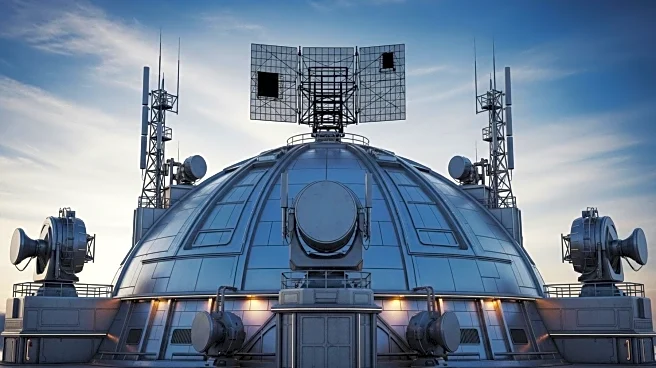What's Happening?
Taiwanese President Lai Ching-te has announced plans to accelerate the development of a 'Taiwan Shield' or 'T-Dome' air defense system in response to increasing military threats from China. During Taiwan's National Day celebrations, Lai pledged to raise defense spending to over 3% of GDP, aiming for 5% by 2030. This initiative is part of Taiwan's strategy to counteract enemy threats and bolster its defense industries. The announcement comes amid heightened tensions, with China regularly conducting military exercises near Taiwan. Lai emphasized Taiwan's commitment to maintaining peace and stability in the Taiwan Strait, while also addressing economic challenges posed by high tariffs imposed by President Trump on Taiwanese exports. Taiwan plans to engage in reciprocal tariff negotiations with the U.S. to secure fair rates.
Why It's Important?
The development of the 'T-Dome' system signifies Taiwan's proactive stance in strengthening its defense capabilities against potential Chinese aggression. This move is crucial for maintaining regional stability and deterring military conflict in the Taiwan Strait. The increase in defense spending aligns with U.S. expectations for Taiwan to bolster its military budget, reflecting the strategic partnership between the two nations. Economically, Taiwan's response to U.S. tariffs highlights the interconnectedness of global trade and the impact of international policies on domestic industries. The situation underscores the delicate balance Taiwan must maintain between asserting its independence and avoiding provocation of China, which claims Taiwan as part of its territory.
What's Next?
Taiwan's government is expected to continue its defense buildup, focusing on high-level detection and interception capabilities. The 'T-Dome' initiative may involve procuring advanced anti-drone systems to counter China's expanding use of military drones. Taiwan's engagement in tariff negotiations with the U.S. will be crucial in mitigating economic impacts on affected sectors. The international community will likely monitor these developments closely, as Taiwan's actions could influence broader geopolitical dynamics in the region. The U.S. may further pressure Taiwan to increase its defense spending, while China may respond with heightened military activities.
Beyond the Headlines
The announcement of the 'T-Dome' system reflects Taiwan's strategic approach to defense, drawing parallels to Israel's Iron Dome. This initiative not only serves as a military deterrent but also as a political signal to the U.S. and other allies of Taiwan's commitment to self-defense. The situation raises ethical questions about the balance between military preparedness and diplomatic efforts to resolve tensions peacefully. Long-term, Taiwan's defense strategy could influence regional security policies and contribute to shifts in international alliances.









